

For a list of Black Friday actions planned nearest you, go to https://blackfridayprotests.org/
» Read more about: Walmart Braces for Black Friday Protests Today »


» Read more about: Happy Thanksgiving — Eat (Not Shop) Till You Drop! »
On the face of it, a report that Walmart has yet to cough up the $7,000 fine it owes the government over an infamous 2008 Black Friday tragedy should be shocking. In fact, Walmart is not simply behind in its payment, it is actively fighting the fine. The incident in question took place when Jdimytai Damour, a store employee at a Long Island Walmart, died during a shopper stampede – a literal “doorbuster” – during which hundreds of people poured through the store’s unhinged glass doors before the dawn of the morning after Thanksgiving.
“Should be shocking,” because somehow we’ve become so used to hearing about the retail giant’s outlandish and dangerous obsession with profits that such news doesn’t surprise many people. Writing in the Huffington Post, Dave Jamieson noted:
For a company with sales of $466 billion last fiscal year, the $7,000 fine from the Occupational Safety and Health Administration represents little more than a single store’s rounding error.
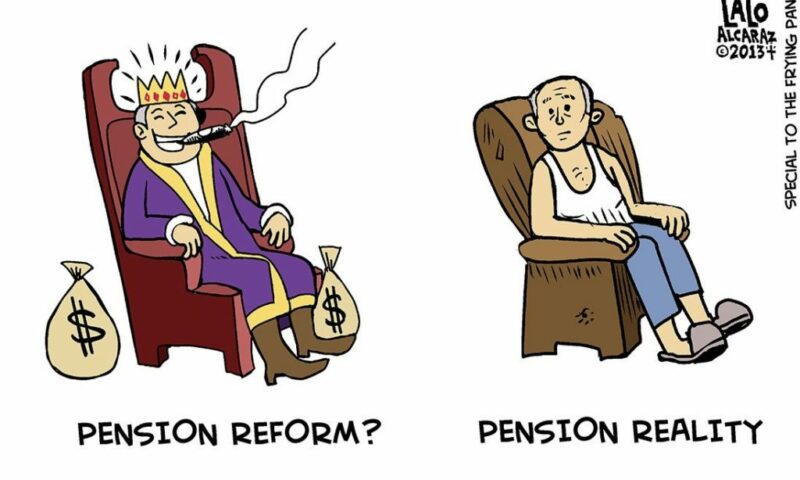
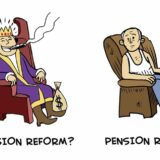
It’s official: America has entered a retirement crisis. Or, as Forbes understatedly put it, “the greatest retirement crisis in the history of the world.”
Frying Pan News recently spoke with some former state, county and municipal workers for a picture of how their retirements have been living up to their expectations.
Norma Anders, Long Beach
Retired career librarian Norma Anders’ eyes light up when she speaks of her 30 years in the City of Los Angeles’ public library system. “We make a big difference,” she declares proudly. “We’re one of the forces that’s giving our country an educated workforce, an informed citizenry. [It’s how] we’re going to be able to keep our [nation] growing and growing.”
Anders is having her morning tea in the well-manicured front yard of the modest clapboard house she shares with her retired husband, David, and her son Lee, who has moved back home while he finishes an accounting degree at Long Beach State.
» Read more about: Not So Golden Years in the Golden State »


This Friday, the busiest shopping day of the year, tens of millions of Americans will travel to Walmart stores to look for holiday discounts on computers, toys and cell phones as well as to buy groceries and basic household items. But at more than 1,500 of Walmart’s 4,000 stores, shoppers will be greeted by Walmart employees handing out leaflets and holding picket signs — “Walmart: Stop Bullying, Stop Firing, Start Paying” and “We’re Drawing a Line at the Poverty Line: $25,000/year” — protesting the company’s abusive labor practices, including poverty-level wages, stingy benefits and irregular work schedules that make it impossible for their families to make ends meet.
The Black Friday rallies and demonstrations represent a dramatic escalation of the growing protest movement among employees of America’s largest private employer. But they also represent the vanguard of a sharp challenge to the nation’s widening economic divide and the declining standard of living among the majority of Americans.
Happy Union Thanksgiving!
The Meal of the Year is here! This is family time, and in the labor movement we know all about the importance of family. The crazy fun of Black Friday follows, so don’t forget to buy union made when you can. And while some stores want to open on Thanksgiving Day this year, we say family, friends and those we care about are worth more than a few extra hours of shopping.
We’ve put together a Thanksgiving shopping list for a great union-made spread. And we realize it can sometimes be difficult to find union made for everything on your list, so another great way to go union is to patronize union grocery stores. So enjoy the day! And we’ve got one more recipe — for stout cake — that you’re going to want to add to the table this year in our Product Spotlight below.


 A recent Los Angeles Times editorial succinctly spelled out the simple truth about a potentially major labor case now before the U.S. Supreme Court. In Unite Here Local 355 v. Mulhall, a hospitality union is seeking to overturn a lower court decision favoring a supposedly disgruntled worker whose case just happened to be taken up by the National Right to Work Legal Defense Foundation.
A recent Los Angeles Times editorial succinctly spelled out the simple truth about a potentially major labor case now before the U.S. Supreme Court. In Unite Here Local 355 v. Mulhall, a hospitality union is seeking to overturn a lower court decision favoring a supposedly disgruntled worker whose case just happened to be taken up by the National Right to Work Legal Defense Foundation.
The case’s backstory is a somewhat complicated tale involving a Florida union local’s attempt to organize workers employed by the operator of a casino and race track. That operator, Mardis Gras Gaming, accepted a “neutrality agreement” with UNITE HERE, in order to give the union access to Mardis Gras’ workers without management objections. The arrangement also allowed for what’s called a card-check election, which is often used to simplify union elections at businesses.
But one Mardis Gras employee,
» Read more about: Supreme Court Considers an Important Labor Case »

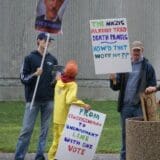
Having failed to defeat the Affordable Care Act in Congress, to beat it back in the last election, to repeal it despite more than 80 votes in the House, to stop it in the federal courts, to get enough votes in the Supreme Court to overrule it and to gut it with outright extortion (closing the government and threatening to default on the nation’s debts unless it was repealed), Republicans are now down to their last ploy.
They are hell-bent on destroying the Affordable Care Act in Americans’ minds.
A document circulating among House Republicans (reported by the New York Times) instructs them to repeat the following themes and stories continuously: “Because of Obamacare, I Lost My Insurance.” “Obamacare Increases Health Care Costs.” “The Exchanges May Not Be Secure, Putting Personal Information at Risk.”
Every Republican in Washington has been programmed to use the word “disaster” whenever mentioning the Act,
» Read more about: Obamacare Smears Can’t Hide Three Major Truths »
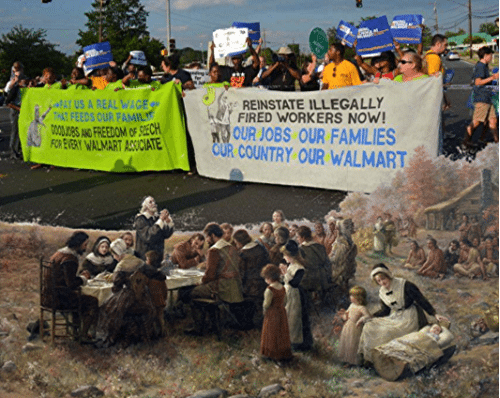

So an Ohio Walmart started a food drive among its employees to help its lower income workers get a decent Thanksgiving. “Please Donate Food Items Here so Associates in Need Can Enjoy Thanksgiving Dinner,” reads a sign in the clerk’s break room. Someone snapped a photo on their cell phone, put it on-line and it went viral. The image underscores what Walmart itself knows: One million of its employees earn less than $25,000 dollars a year – impossible to live on in Ohio, much less Los Angeles, where an average apartment rents for $1,480 a month.
But did you know that L.A. County also leads the nation in “food insecurity”? That’s the current euphemism that means people are likely to go hungry. A national network of food banks estimated that 650,000 children in our county risk going without enough to eat. These are kids who live with parents or guardians who cannot afford a balanced meal or who skip dinner themselves to feed their children.

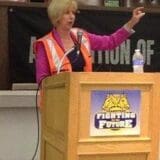
The twin harbors at the Ports of Los Angeles and Long Beach handle 40 percent of the nation’s imported cargo and generate some of the best middle-class jobs in Southern California. And yet it would be a serious mistake to believe that all who work in the transportation of goods share in the bounty provided by port traffic.
Writing in today’s Los Angeles Times, Congresswoman Janice Hahn notes that “many of the truck drivers who serve the ports find themselves stuck at the bottom of the economic ladder because of the way their employers classify and exploit them.”
The drivers Hahn speaks of are mostly immigrant workers employed by companies who label them as “independent contracts” — a ploy that enables the companies to deduct their own trucking-related business expenses from their drivers’ wages. Hahn recalls speaking to drivers who have told her that, under this system,
» Read more about: Janice Hahn: Port Drivers Must Be Treated Fairly »